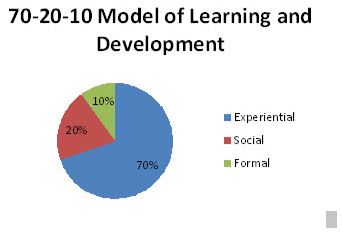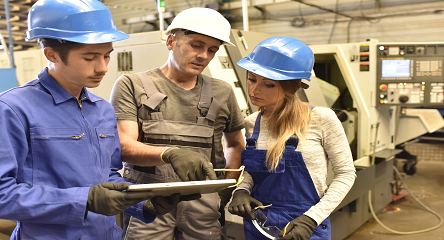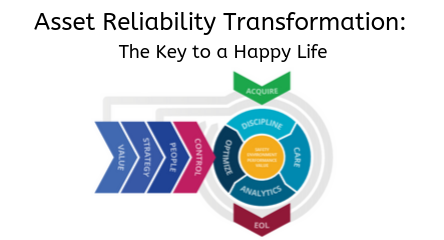A major competitive advantage for a company is its employees’ ability to learn, grow and change so they can discover, improve, innovate and meet the challenges of today’s marketplace. An additional challenge many process organizations struggle with is how to harness the intellectual capital of experienced employees and use it to benefit new employees and inform enterprise initiatives.
The type of intellectual capital we’re talking about doesn’t typically get delivered in a classroom. According to the 70-20-10 framework, about 10% of learning comes from a formal learning environment (online or classroom), 70% of learning comes from experiential opportunities (e.g. day-to-day learning, challenging projects/tasks, stretch goals) and 20% from social learning (mentoring, coaching). Although formal instruction (online or classroom), is critical to developing talent in your organization; it is a small part of how we learn and grow.

With so much learning happening every day between leaders, managers, employees, vendors and clients, it’s time to take a closer look at our roles and see how we may function as coaches, knowledge agents and advocates for professional growth and change. Who are the hidden coaches in my organization? How can we harness that extra 20% of learning to produce results and influence what we teach and make the most of the critical 10%?
The Skilled Worker as Hidden Coach
A skilled worker can be an excellent “hidden coach” or ambassador of knowledge. Although an employee may not have the title of “expert” or “coach”, a skilled worker can be considered an expert in a field and are frequently asked to share their knowledge to enhance competency in a certain area.
A few examples of hidden coaches you might find in your company:
· A tenured work planner
· An experienced operator
· A skilled maintenance technician or journeyman
· A millwright
· A veteran craftsperson
· A software system “power user”
· A financial or contract analyst
· A top-selling salesperson
· A Six-Sigma green or black belt
A hidden coach is a knowledge powerhouse that can share their intellectual capital during employee onboarding, change and improvement initiatives, everyday problem solving activities and work planning. Their individual consult can drive solution design, identify process re-engineering needs, steer work procedure documentation and influence training requirements. An additional benefit to having a hidden coach on your team could be their informal leadership. As a respected or influential person within the organization, their credibility can be a positive or negative risk to your initiative.
To make use of their tacit knowledge, project leads should ensure the employee’s practices align with standards, invite the hidden coaches to contribute and participate, and record best practices for enterprise use.
Every organization has hidden coaches with the capacity to tutor and motivate employees to practice behaviors that produce results. With 90% of learning coming from on-the-job challenges and social learning through coaching, these hidden gems can be incorporated into both strategic and daily initiatives to manage your company’s intellectual capital and strengthen workforce skills.






